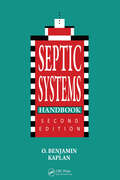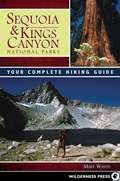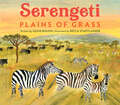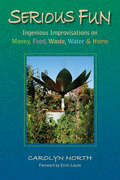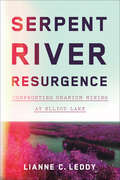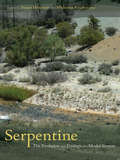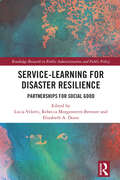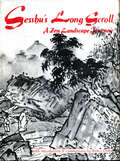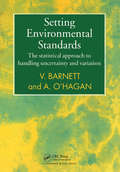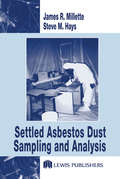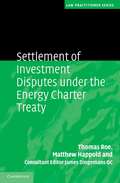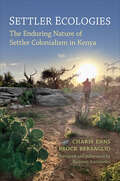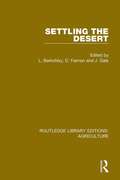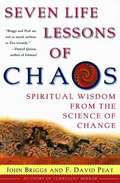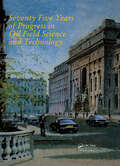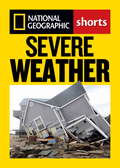- Table View
- List View
Septic Systems Handbook
by O. Benjamin KaplanSeptic Systems Handbook, Second Edition covers all aspects of such topics as septic tanks, perk tests, leachlines, and onsite disposal technologies. This handy reference is filled with numerous practical tips for troubleshooting and creative problem solving. The many appendices offer valuable information, including dealing effectively with bureaucr
Sequences
by Leslie Norris[from the back cover] "LESLIE NORRIS'S eleventh collection of poetry, Sequences, brings together some of his strongest and most eloquent recent work. Norris's poetry is marked by a keen eye for the natural world and with rich, pleasing music. It is by turns celebratory and elegaic, now praising nature's complexities, now mourning our transitory place in the world. Two long poems frame this book, one set in North America (seen from the eye of a hawk), the other in the author's native Wales. Norris's topography is simultaneously vital and magical. It is destined to find a secure place in our literature. Leslie Norris's many books include Walking the White Fields: Poems 1967-80, two collections of stories, Sliding and The Girl from Cardigan (also published by Gibbs M. Smith, Inc.), a study of Dylan Thomas, and Norris's Ark, a selection of his children's verse. A frequent contributor to the Atlantic and the New Yorker, he has taught at a number of universities in England and America."
Sequoia and Kings Canyon National Parks
by Mike WhiteThe southern High Sierra, including Sequoia and Kings Canyon National Parks and the surrounding John Muir, Jennie Lakes, and Monarch Wildernesses, is one of the most magnificent natural areas in the world. Blessed with the largest trees on earth (giant sequoias), one of the deepest canyons in North America (Kings Canyon), and the highest mountain in the continental U.S. (Mt. Whitney), the greater Sequoia-Kings Canyon region offers unparalleled mountain majesty. Along with such superlatives, hundreds of miles of trail provides access to a boundless number of high mountain lakes, wildflower-covered meadows, cascading streams, deep forests, and craggy peaks. Mike White's guide is the only comprehensive guide to this portion of John Muir's Range of Light.
Serengeti IV: Sustaining Biodiversity in a Coupled Human-Natural System
by John M. Fryxell Anthony R. E. Sinclair Kristine L. Metzger Simon A. R. MdumaThe vast savannas and great migrations of the Serengeti conjure impressions of a harmonious and balanced ecosystem. But in reality, the history of the Serengeti is rife with battles between human and non-human nature. In the 1890s and several times since, the cattle virus rinderpest at last vanquished in 2008 devastated both domesticated and wild ungulate populations, as well as the lives of humans and other animals who depended on them. In the 1920s, tourists armed with the world s most expensive hunting gear filled the grasslands. And in recent years, violence in Tanzania has threatened one of the most successful long-term ecological research centers in history. "Serengeti IV," the latest installment in a long-standing series on the region s ecology and biodiversity, explores the role of our species as a source of both discord and balance in Serengeti ecosystem dynamics. Through chapters charting the complexities of infectious disease transmission across populations, agricultural expansion, and the many challenges of managing this ecosystem today, this book shows how the people and landscapes surrounding crucial protected areas like Serengeti National Park can and must contribute to Serengeti conservation. In order to succeed, conservation efforts must also focus on the welfare of indigenous peoples, allowing them both to sustain their agricultural practices and to benefit from the natural resources provided by protected areas an undertaking that will require the strengthening of government and education systems and, as such, will present one of the greatest conservation challenges of the next century. "
Serengeti: Plains of Grass
by Leslie BulionAward-winning science poetry master Leslie Bulion presents a lyrical salute to Africa's Serengeti Plain, one of the most spectacular and productive ecosystems on Earth.Leslie Bulion, a virtuoso science poet, has created a portrait of the rainy season on East Africa's southern Serengeti Plain, offering young readers a compelling look at an ecosystem in motion. Using a series of interconnected verses inspired by an East African Swahili poem form—the utendi—Bulion's cadences and rhythmic lines mimic the web of life in the Serengeti, following the great migration of wildebeest, zebras, and other animals into and then out of the vast short-grass plain. Lush, evocative gouache illustrations by Becca Stadtlander showcase the grandeur of this immense and complex ecosystem and provide close-up details of its wildlife inhabitants. Scientific notes on each spread and comprehensive back matter material offer more specifics. This, paired with Bulion's brilliant poetic form, makes the book ideal for cross-curricular learning. A Booklist Editors&’ Choice Selection <P><P><i>Advisory: Bookshare has learned that this book offers only partial accessibility. We have kept it in the collection because it is useful for some of our members. Benetech is actively working on projects to improve accessibility issues such as these.</i>
Sergio and the Hurricane
by Alexandra WallnerA young boy is excited when he hears that a hurricane is coming to his oceanfront home in San Juan, Puerto Rico, but when it comes, he learns how dangerous hurricanes can be.
Serious Fun
by Ervin Laszlo Carolyn NorthCreative and innovative solutions to difficult issues are presented in this practical guidebook for environmentally friendly living. Low-tech exercises for saving water, reducing waste, and preparing food help readers take communal actions to benefit their own neighborhoods, and the world at large, while having fun. By stressing that what is most essential is for human beings to relax, work, and play together, this humorous yet important resource shows that an attitude of creativity and abundance will transform environmental challenges into opportunities for personal and collective growth.
Serpent River Resurgence: Confronting Uranium Mining at Elliot Lake
by Lianne C. LeddySerpent River Resurgence tells the story of how the Serpent River Anishinaabek confronted the persistent forces of settler colonialism and the effects of uranium mining at Elliot Lake, Ontario. Drawing on extensive archival sources, oral histories, and newspaper articles, Lianne C. Leddy examines the environmental and political power relationships that affected her homeland in the Cold War period. Focusing on Indigenous-settler relations, the environmental and health consequences of the uranium industry, and the importance of traditional uses of land and what happens when they are compromised, Serpent River Resurgence explores how settler colonialism and Anishinaabe resistance remained potent forces in Indigenous communities throughout the second half of the twentieth century.
Serpentine: The Evolution and Ecology of a Model System
by Susan Harrison Nishanta RajakarunaSerpentine soils have long fascinated biologists for the specialized floras they support and the challenges they pose to plant survival and growth. This volume focuses on what scientists have learned about major questions in earth history, evolution, ecology, conservation, and restoration from the study of serpentine areas, especially in California. Results from molecular studies offer insight into evolutionary patterns, while new ecological research examines both species and communities. Serpentine highlights research whose breadth provides context and fresh insights into the evolution and ecology of stressful environments.
Service-Learning for Disaster Resilience: Partnerships for Social Good (Routledge Research in Public Administration and Public Policy)
by Lucia Velotti Rebecca Morgenstern Brenner Elizabeth A. DunnThis book is the first to discuss, in practical and theoretical terms, the pedagogical approach of service-learning to establish partnerships for social good that build disaster resilience. Across twelve chapters a collection of academics and practitioners provide insights on the benefits of utilizing service-learning to address existing needs, build community capacity, and strengthen social networks while enhancing student learning. Key features: Discuss how sustainable service-learning partnerships can contribute to building disaster-resilient communities; Provide practical tools to cultivate and manage collaborative partnerships, and engage in reflective practices; Integrate disciplines to create innovative approaches to complex problems; Share best practices, lessons learned, and case examples that identify strategies for integrating service-learning and research into course design; Offer considerations for ethical decision-making and for the development of equitable solutions when engaging with stakeholders; Identify strategies to bridge the gap between academia and practice while highlighting resources that institutions of higher education can contribute toward disaster preparedness, response, recovery, and mitigation. Service-Learning for Disaster Resilience will serve as a user-friendly guide for universities, local government agencies, emergency management professionals, community leaders, and grassroots initiatives in affected communities.
Service-Learning for Disaster Resilience: Partnerships for Social Good (Routledge Research in Public Administration and Public Policy)
by Lucia Velotti Rebecca Morgenstern Brenner Elizabeth A. DunnThis book is the first to discuss, in practical and theoretical terms, the pedagogical approach of service-learning to establish partnerships for social good that build disaster resilience. Across 12 chapters a collection of academics and practitioners provide insights on the benefits of utilizing service-learning to address existing needs, build community capacity, and strengthen social networks while enhancing student learning.Key features: Discuss how sustainable service-learning partnerships can contribute to building disaster-resilient communities; Provide practical tools to cultivate and manage collaborative partnerships, and engage in reflective practices; Integrate disciplines to create innovative approaches to complex problems; Share best practices, lessons learned, and case examples that identify strategies for integrating service-learning and research into course design; Offer considerations for ethical decision-making and for the development of equitable solutions when engaging with stakeholders; Identify strategies to bridge the gap between academia and practice while highlighting resources that institutions of higher education can contribute toward disaster preparedness, response, recovery, and mitigation. Service-Learning for Disaster Resilience will serve as a user-friendly guide for universities, local government agencies, emergency management professionals, community leaders, and grassroots initiatives in affected communities.
Sesshu's Long Scroll: A Zen Landscape Journey
by Reiko ChibaSesshu's Long Sroll is the masterwork of the 15th-century Japanese artist, Susshu-considered by many Japanese to be their greatest.<P><P>Famed not only as a painter but also as a Zen priest and a great traveler, Sesshu found inspiration for his wonderful landscapes both in China and Japan. This magnificent scroll, which pictures the procession of the seasons, is essentially religious painting with a strong atmosphere of Zen Buddhism. Nature, rather than man, is dominant, although the human touch is charmingly evident from time to time. One can take this fascinating Zen landscape journey again and again, and always find new delights.
Setting Environmental Standards: The Statistical Approach to Handling Uncertainty and Variation
by Vic Barnett A. O'HaganIntroducing a novel approach to setting environmental pollution standards that allow for proper treatment of uncertainty and variation, this book surveys the forms of standards and proposes a new kind of "statistically verifiable ideal standard."Setting Environmental Standards includes:a current analysis regarding the treatment of uncertainty and variation in environmental standard settinga review of basic principles in standard setting, including costs, actions and effects, and benefitsexamples where uncertainty and variation have been well-treated in current practice as well as examples where clear deficiencies are apparentspecific proposals for the future approach to setting environmental pollution standards - encompassing the anticipated elements of uncertainty and variabilityThe issues discussed serve statisticians as well as those persons involved with environmental standards. Scientists in agencies responsible for setting standards, in organizations advising such agencies or working in industries subject to these standards, will find Setting Environmental Standards an invaluable reference.
Settled Asbestos Dust Sampling and Analysis
by Steve M. Hays James R. MilletteSettled Asbestos Dust Sampling and Analysis compiles the most significant data on asbestos in settled dust. This ready reference presents an analysis of settled dusts and surface particles of all sizes for asbestosthat is useful for qualitative and quantitative assessment and helps to determine the source of fibers. The main scope of this reference includes sample collection, sample analyses, and interpretation of settled dust data, as well as the use of such data for purposes including asbestos abatement projects and in-place management programs. Sections on lead and other particulates are also included.
Settled in the Wild: Notes from the Edge of Town
by Susan Hand ShetterlyWhether we live in cities, suburbs, or villages, we are encroaching on nature, and it in one way or another perseveres. Naturalist Susan Shetterly looks at how animals, humans, and plants share the land-observing her own neighborhood in rural Maine. She tells tales of the locals (humans, yes, but also snowshoe hares, raccoons, bobcats, turtles, salmon, ravens, hummingbirds, cormorants, sandpipers, and spring peepers). She expertly shows us how they all make their way in an ever-changing habitat. In writing about a displaced garter snake, witnessing the paving of a beloved dirt road, trapping a cricket with her young son, rescuing a fledgling raven, or the town's joy at the return of the alewife migration, Shetterly issues warnings even as she pays tribute to the resilience that abounds. Like the works of Annie Dillard and Aldo Leopold, Settled in the Wild takes a magnifying glass to the wildness that surrounds us. With keen perception and wit, Shetterly offers us an education in nature, one that should inspire us to preserve it.
Settled in the Wild: Notes from the Edge of Town
by Susan Hand ShetterlyWhether we live in cities, suburbs, or villages, we are encroaching on nature, and it in one way or another perseveres. Naturalist Susan Shetterly looks at how animals, humans, and plants share the land—observing her own neighborhood in rural Maine. She tells tales of the locals (humans, yes, but also snowshoe hares, raccoons, bobcats, turtles, salmon, ravens, hummingbirds, cormorants, sandpipers, and spring peepers). She expertly shows us how they all make their way in an ever-changing habitat. In writing about a displaced garter snake, witnessing the paving of a beloved dirt road, trapping a cricket with her young son, rescuing a fledgling raven, or the town's joy at the return of the alewife migration, Shetterly issues warnings even as she pays tribute to the resilience that abounds. Like the works of Annie Dillard and Aldo Leopold, Settled in the Wild takes a magnifying glass to the wildness that surrounds us. With keen perception and wit, Shetterly offers us an education in nature, one that should inspire us to preserve it.
Settlement of Investment Disputes under the Energy Charter Treaty
by Thomas Roe Matthew HappoldThe Energy Charter Treaty has come of age, with almost 50 States parties and a small but growing body of arbitral case law. In this new study of the Treaty's investment protection provisions, Thomas Roe and Matthew Happold set out to identify and explain the Treaty's principal provisions and to suggest answers to some of the difficult problems thrown up by its drafting. They discuss in detail questions such as the standards of protection granted by the Treaty and the international responsibility of States for breaches of the Treaty, the various procedures available for the vindication of rights under the Treaty and the conditions to be satisfied before a claimant's complaint may be considered on the merits. Specific issues addressed include the impact of EU law on claims under the Treaty and the Treaty's provisions concerning taxation.
Settler Ecologies: The Enduring Nature of Settler Colonialism in Kenya
by Charis Enns Brock BersaglioSettler Ecologies tells the story of how settler colonialism becomes memorialized and lives on through ecological relations. Drawing on eight years of research in Laikipia, Kenya, Charis Enns and Brock Bersaglio use immersive methods to reveal how animals and plants can be enrolled in the reproduction of settler colonialism. The book details how ecological relations have been unmade and remade to enable settler colonialism to endure as a structure in this part of Kenya. It describes five modes of violent ecological transformation used to prolong structures of settler colonialism: eliminating undesired wild species; rewilding landscapes with more desirable species to settler ecologists; selectively repeopling wilderness to create seemingly more inclusive wild spaces and capitalize on biocultural diversity; rescuing injured animals and species at risk of extinction to shore up moral support for settler ecologies; and extending settler ecologies through landscape approaches to conservation that scale wild spaces. Settler Ecologies serves as a cautionary tale for future conservation agendas in all settler colonies. While urgent action is needed to halt global biodiversity loss, this book underscores the need to continually question whether the types of nature being preserved advance settler colonial structures or create conditions in which ecologies can otherwise be (re)made and flourish.
Settling Nature: The Conservation Regime in Palestine-Israel
by Irus BravermanA study of Palestine-Israel through the unexpected lens of nature conservation Settling Nature documents the widespread ecological warfare practiced by the state of Israel. Recruited to the front lines are fallow deer, gazelles, wild asses, griffon vultures, pine trees, and cows—on the Israeli side—against goats, camels, olive trees, hybrid goldfinches, and akkoub—which are affiliated with the Palestinian side. These nonhuman soldiers are all the more effective because nature camouflages their tactical deployment as such.Drawing on more than seventy interviews with Israel&’s nature officials and on observations of their work, this book examines the careful orchestration of this animated warfare by Israel&’s nature administration on both sides of the Green Line. Alongside its powerful protection of wildlife biodiversity, the territorial reach of Israel&’s nature protection is remarkable: to date, nearly 25 percent of the country&’s total land mass is assigned as a park or a reserve. Settling Nature argues that the administration of nature advances the Zionist project of Jewish settlement and the corresponding dispossession of non-Jews from this space.
Settling the Desert (Routledge Library Editions: Agriculture #16)
by L. Berkofsky D. Faiman J. GaleFirst published in 1981. Settling the Desert is an attempt to organise those aspects of scientific and sociological research that are the necessary prerequisites for making the desert a comfortable and profitable place for man to inhabit. In this book, experts from many fields of desert research review the history of desert settlement and agriculture, as well as the present problems encountered by modern desert settlers. Topics discussed include: meteorology, sociology, ecology, water resources, solar energy, innovative desert agriculture, architecture, and animal science.
Seven Life Lessons of Chaos: Spiritual Wisdom from the Science of Change
by F. David Peat John BriggsIntroduces the major ideas of chaos theory. Shows how they can be used metaphorically in day to day living.
Seven Special Somethings: A Nowruz Story
by Adib KhorramA picture book celebrating Persian New Year by award-winning author Adib KhorramKian can't wait for Persian New Year! His family has already made a haft-seen, and Kian's baba and maman told him that all the things on it start with S and will bring them joy in the new year. Kian wonders if he could add just one more S, to make his family even happier. Hmm . . . Sonny the cat's name starts with S--but Sonny knocks the whole table over! Can Kian find seven special somethings to make a new haft seen before his family arrives for their Nowruz celebration?
Seven Worlds One Planet
by Scott Alexander Jonny KeelingWelcome home. A place 200 million years in the making.Long ago, our planet had only one gigantic land mass. Then something monumental happened. That supercontinent ruptured and seven different worlds were born. Each of those worlds - or continents - evolved, and continues to evolve, its own way of life. From the jungle of the Congo or the majestic Himalayas to the densely populated wilds of Europe or the comparatively isolated Australasia, Seven Worlds, One Planet explores the natural wonders that give each of our continents its distinct character. Following the animals that have made these iconic environments their home, it discovers spectacular wildlife stories that reveal what makes each of these seven worlds unique. With a foreword by Sir David Attenborough and over 250 breathtaking images, including stills from the BBC Natural History Unit’s spectacular footage, Seven Worlds, One Planet is a stunning exploration of the planet, and the worlds within it, that we call home.
Seventy Five Years of Progress in Oil Field Science and Technology: Proceedings of the 75th anniversary symposium, London, 12 July 1988
by M.ALA; H.HATAMIAN; G.D.HOBSON; M.S.KING; I.WILLIAMSONThis volume contains the proceedings of the 75th anniversary of Progress in Oil Field Science and Technology as gathered at the symposium in London on 12th July 1988.
Severe Weather
by National GeographicWeather-related tragedies have fascinated humans throughout time. For those who loved The Perfect Storm andKrakatoa, the millions who log onto daily weather forecasting sites and check weather apps, and people who can't get enough front-page headlines of global natural disasters. Earthquakes, hurricanes, tornados, floods, forest fires, blizzards, and thunderstorms: National Geographic explores the deadliest of these disasters throughout history and arms you with ways to protect yourself from chaos and destruction. From the 1906 earthquake that flattened San Francisco and the morbid 1889 flash flood that wiped out the entire town of Johnstown, Pennsylvania, to the Superstorm of 1993 that blanketed Florida in snow and the more recent East Coast and Gulf Coast ravages of hurricanes Katrina and Sandy, the destructive force and human tragedy both fascinates and horrifies. In addition to these gripping stories, NGS provides practical tips for surviving at home and weathering the lethal strength of these events if caught outside.
